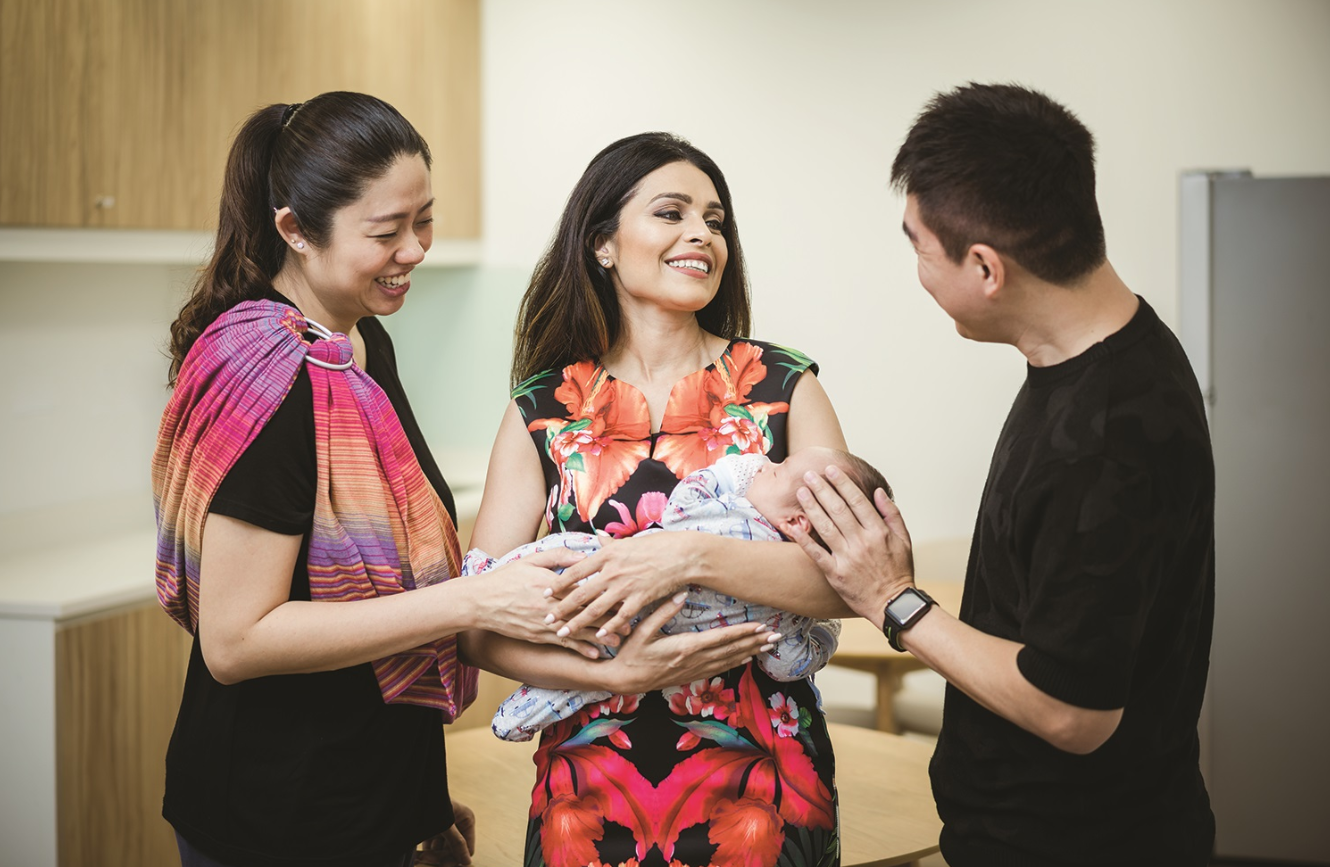Mobile application helps improve parents’ emotional well-being and infants’ overall development
 A/Prof Shefaly Shorey (centre) with parents and their infant (Credit: NUS Nursing)
A/Prof Shefaly Shorey (centre) with parents and their infant (Credit: NUS Nursing)
Singapore, 3 January 2024—The arrival of a newborn is a delightful occasion for many parents, but the transition to parenthood can be challenging. Adjusting to new or additional parenting responsibilities often results in increased stress levels and sleep deprivation for both mothers and fathers. This is also exacerbated by the lack of support for the new parents and issues related to the health of the newborn.
However, an app providing helpful information and tips from doctors and other infant care experts on caring for the newborn is proving to be a boon for stressed and anxious parents. The app, developed by the Alice Lee Centre for Nursing Studies at the Yong Loo Lin School of Medicine, National University of Singapore (NUS Nursing), provides information catered to local parents, through videos, podcasts, and written articles that were developed by local experts. These experts comprised obstetricians, psychiatrists, nurses, and midwives from NUS Nursing, NUS Medicine, the National University Hospital, National University Polyclinics, KK Women’s and Children’s Hospital, and Singapore General Hospital. The content provided on the Supportive Parenting Application (SPA) includes information on parental self-care, parenting, and baby care, such as tutorials on baby bathing, bonding with the newborn and breastfeeding, as well as tips on coping with psychological and emotional challenges after birth. The SPA also has a discussion forum for parents to post personal queries and respond to other parents’ queries, as well as a chat function for parents to converse with someone from the study’s pool of 29 trained peer volunteers (who are parents themselves with similar socio-demographic and parenting backgrounds), for emotional support.
The app’s effectiveness was studied amidst the COVID-19 pandemic by Associate Professor Shefaly Shorey and her team at NUS Nursing. Over a period of 3 years, the team observed its effectiveness on parental outcomes—including postnatal depression, anxiety, parental bonding, parental self-efficacy, perceived social support, and parenting satisfaction, as well as infant developmental outcomes. During the perinatal period, which refers to the time from the start of pregnancy to a year after giving birth, the team found that both fathers and mothers who used the mobile app showed better parental outcomes, especially in perceived social support. Parents who used the app had significantly higher help-seeking scores than those who did not use the app during the post-childbirth period. Due to increased struggles from coping with additional parenting responsibilities after childbirth, most parents screened higher for depressive symptoms scores. However, depressive symptoms in mothers who used the app gradually decreased over time after one month postpartum. This reduction in depressive symptoms was maintained until the last follow-up at nine months postpartum. In contrast, depressive symptoms among mothers who did not use the app started to increase post-childbirth.
Infants whose parents had used the app also fared better in most developmental outcome measures. The chances of these infants being at risk for certain developmental delays were lower compared to infants whose parents did not use the app—including cognitive (5.5% vs 23.8%), motor (9.1% vs 19.0%), communication (1.5% vs 4.4%) and social (18.2% vs 20.0%) skills.
Assoc Prof Shorey said, “Despite the difficulties that accompanied their parenting journey, especially during the COVID-19 pandemic, mothers and fathers were able to receive timely and useful support from the resources provided through the mobile app. Our study proved that the mobile health intervention was a good source of evidence-based yet localised information and reliable support, to help parents care for newborns and their own emotional and overall well-being.”
The research team began their study in February 2020, when they recruited 200 pregnant women and their husbands, who ranged from 26 to 41 years old, from at least 24 weeks of gestation (third trimester of pregnancy). The team conducted questionnaires, newborn assessments, and interviews with the parents up to one year postpartum and published their findings in five separate papers in the Journal of Medical Internet Research and Journal of Clinical Nursing, from 2021 to 2023. The SPA was found to be a dependable information source for parents, especially during the COVID-19 period when access to resources and tangible support was limited.
The study also examined the experiences of peer volunteers in providing support to others and their usage of SPA. It was found that providing peer support helped improve the mental and emotional well-being of those who had experienced postnatal depression in the past.
Technology-based interventions developed by healthcare professionals, providing peer support and information localised for the context of parents in Singapore, as well as sections specific to fathers, can altogether supplement the care provided by healthcare professionals to provide more holistic perinatal support for parents, and help them and their infants achieve better parental and developmental outcomes respectively.
The research team plans to extend the project by further enhancing the SPA and evaluating it among parents with psycho-social disadvantages and vulnerable backgrounds such as low socio-economic status and those having children with special needs. The NUS Nursing team hopes that the SPA and its content can be made available for local parents in the coming years.


